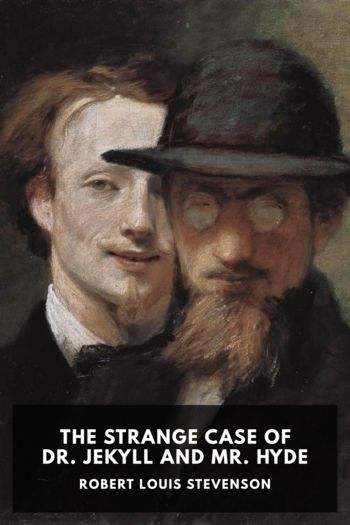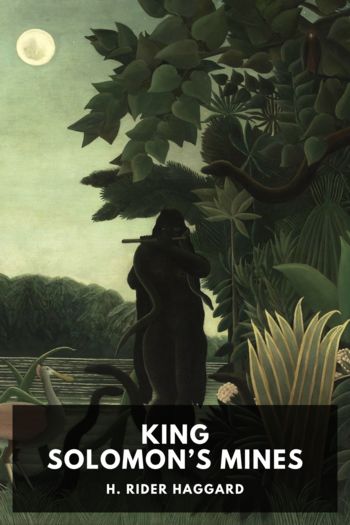Catriona - Robert Louis Stevenson (the kiss of deception read online .TXT) 📗

- Author: Robert Louis Stevenson
Book online «Catriona - Robert Louis Stevenson (the kiss of deception read online .TXT) 📗». Author Robert Louis Stevenson
“How did you know the hour to bide your tryst?” I asked.
“The goodman brought me my meat and a drop brandy, and a candle-dowp to eat it by, about eleeven,” said he. “So, when I had swallowed a bit, it would be time to be getting to the wood. There I lay and wearied for ye sore, Davie,” says he, laying his hand on my shoulder, “and guessed when the two hours would be about by—unless Charlie Stewart would come and tell me on his watch—and then back to the dooms haystack. Na, it was a driech employ, and praise the Lord that I have warstled through with it!”
“What did you do with yourself?” I asked.
“Faith,” said he, “the best I could! Whiles I played at the knucklebones. I’m an extraordinar good hand at the knucklebones, but it’s a poor piece of business playing with naebody to admire ye. And whiles I would make songs.”
“What were they about?” says I.
“O, about the deer and the heather,” says he, “and about the ancient old chiefs that are all by with it long syne, and just about what songs are about in general. And then whiles I would make believe I had a set of pipes and I was playing. I played some grand springs, and I thought I played them awful bonny; I vow whiles that I could hear the squeal of them! But the great affair is that it’s done with.”
With that he carried me again to my adventures, which he heard all over again with more particularity, and extraordinary approval, swearing at intervals that I was “a queer character of a callant.”
“So ye were frich’ened of Sym Fraser?” he asked once.
“In troth was I!” cried I.
“So would I have been, Davie,” said he. “And that is indeed a dreidful man. But it is only proper to give the de’il his due; and I can tell you he is a most respectable person on the field of war.”
“Is he so brave?” I asked.
“Brave!” said he. “He is as brave as my steel sword.”
The story of my duel set him beside himself.
“To think of that!” he cried. “I showed ye the trick in Corrynakiegh too. And three times—three times disarmed! It’s a disgrace upon my character that learned ye! Here, stand up, out with your airn; ye shall walk no step beyond this place upon the road till ye can do yoursel’ and me mair credit.”
“Alan,” said I, “this is midsummer madness. Here is no time for fencing lessons.”
“I cannae well say no to that,” he admitted. “But three times, man! And you standing there like a straw bogle and rinning to fetch your ain sword like a doggie with a pocket-napkin! David, this man Duncansby must be something altogether by-ordinar! He maun be extraordinar skilly. If I had the time, I would gang straight back and try a turn at him mysel’. The man must be a provost.”
“You silly fellow,” said I, “you forget it was just me.”
“Na,” said he, “but three times!”
“When ye ken yourself that I am fair incompetent,” I cried.
“Well, I never heard tell the equal of it,” said he.
“I promise you the one thing, Alan,” said I. “The next time that we forgather, I’ll be better learned. You shall not continue to bear the disgrace of a friend that cannot strike.”
“Ay, the next time!” says he. “And when will that be, I would like to ken?”
“Well, Alan, I have had some thoughts of that, too,” said I; “and my plan is this. It’s my opinion to be called an advocate.”
“That’s but a weary trade, Davie,” says Alan, “and rather a blagyard one forby. Ye would be better in a king’s coat than that.”
“And no doubt that would be the way to have us meet,” cried I. “But as you’ll be in King Lewie’s coat, and I’ll be in King Geordie’s, we’ll have a dainty meeting of it.”
“There’s some sense in that,” he admitted.
“An advocate, then, it’ll have to be,” I continued, “and I think it a more suitable trade for a gentleman that was three times disarmed. But the beauty of the thing is this: that one of the best colleges for that kind of learning—and the one where my kinsman, Pilrig, made his studies—is the college of Leyden in Holland. Now, what say you, Alan? Could not a cadet of Royal Ecossais get a furlough, slip over the marches, and call in upon a Leyden student!”
“Well, and I would think he could!” cried he. “Ye see, I stand well in with my colonel, Count Drummond-Melfort; and, what’s mair to the purpose, I have a cousin of mine lieutenant-colonel in a regiment of the Scots-Dutch. Naething could be mair proper than what I would get a leave to see Lieutenant-Colonel Stewart of Halkett’s. And Lord Melfort, who is a very scienteefic kind of a man, and writes books like Caesar, would be doubtless very pleased to have the advantage of my observes.”
“Is Lord Melfort an author, then?” I asked, for much as Alan thought of soldiers, I thought more of the gentry that write books.
“The very same, Davie,” said he. “One would think a colonel would have something better to attend to. But what can I say that make songs?”
“Well, then,” said I, “it only remains you should give me an address to write you at in France; and as soon as I am got to Leyden I will send you mine.”
“The best will be to write me in the care of my chieftain,” said he, “Charles Stewart, of Ardsheil, Esquire, at the town of Melons, in the Isle of France. It might take long, or it might take short, but it would aye get to my hands at the last of it.”
We had a





Comments (0)